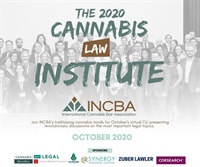
- Average Rating:
- Not yet rated
- Bundle(s):
- CLI2025 On-Demand
- Categories:
- Hemp | Hemp Law
- Faculty:
- Joanne Caceres | Judge Mary A. Celeste, (Ret.), J.D. | Courtney Moran, LL.M. | Garrett Graff
- Duration:
- 1 Hour 1 Minutes
- Format:
- Audio and Video
- SKU:
- INCBA080825hempOD
- License:
- Access for 6 month(s) after purchase.
- Short Description:
- Hemp’s New Highs: Legal Battles and the Future of Intoxicating Hemp. Join leading legal experts, industry insiders, and policy advocates for an in-depth exploration of the rapidly evolving landscape of intoxicating hemp.
- Price:
- $30.00 - $75.00
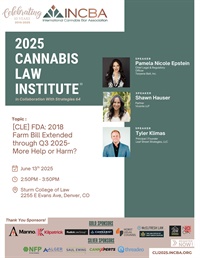
- Average Rating:
- Not yet rated
- Bundle(s):
- CLI2025 On-Demand
- Categories:
- Hemp | Hemp Law
- Faculty:
- Pamela Epstein | Tyler Klimas | Nathan Mattison
- Duration:
- 1 Hour 3 Minutes
- Format:
- Audio and Video
- SKU:
- INCBA080825farmOD
- License:
- Access for 6 month(s) after purchase.
- Short Description:
- FDA: 2018 Farm Bill Extended through Q3 2025- More Help or Harm? One plant has received two very different treatments under federal law since 2018. Hear from legal luminaries on...
- Price:
- $30.00 - $75.00
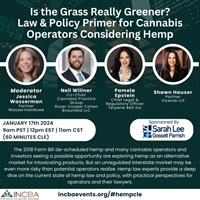
- Average Rating:
- 10
- Categories:
- Hemp | Hemp Law
- Faculty:
- Jessica Wasserman, JD | Neil Willner | Pamela Epstein | Shawn Hauser
- Duration:
- 1 Hour 30 Minutes
- Format:
- Audio and Video
- SKU:
- INCBA011724hemplawOD
- License:
- Access for 6 month(s) after purchase.
- Short Description:
- The 2018 Farm Bill de-scheduled hemp and many cannabis operators and investors fatigued by over-regulation are exploring hemp as an alternative market for intoxicating products. But an unregulated interstate market may be even more risky than potential operators realize. Hemp law experts provide a deep dive on the current state of hemp law and policy, with practical perspectives for operators and their lawyers.
- Price:
- $30.00 - $75.00
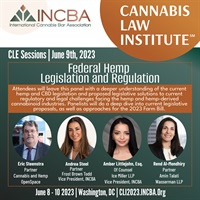
- Average Rating:
- 2
- Bundle(s):
- CLI2023 On-Demand | CLI2023 Federal Policy Bundle
- Categories:
- Federal Law | Federal Policy | Hemp | Hemp Law | Regulation law | Regulations | Regulatory
- Faculty:
- Rend Al-Mondhiry | Amber Littlejohn, Esq. | Andrea Steel | Eric Steenstra
- Duration:
- 1 Hour 5 Minutes
- Format:
- Audio and Video
- SKU:
- INCBA072023fedhempOD
- License:
- Access for 6 month(s) after purchase.
- Short Description:
- Attendees will leave this panel with a deeper understanding of the current hemp and CBD legislation and proposed legislative solutions to current regulatory and legal challenges facing the hemp and hemp-derived cannabinoid industries. Panelists will do a deep dive into current legislative proposals, as well as approaches for the 2023 Farm Bill.
- Price:
- $30.00 - $75.00
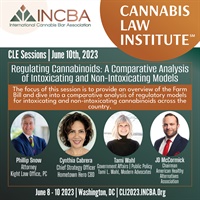
- Average Rating:
- 2
- Bundle(s):
- CLI2023 On-Demand | CLI2023 State Cannabis Regulation Bundle
- Categories:
- Cannabinoids | Consumption Law | Emerging Cannabinoids | Hemp | Hemp Law
- Faculty:
- Cynthia Cabrera | JD McCormick | Philip Snow | Tami Wahl
- Duration:
- 57 Minutes
- Format:
- Audio and Video
- SKU:
- INCBA072023intoxicatingOD
- License:
- Access for 6 month(s) after purchase.
- Short Description:
- Regulating Cannabinoids: A Comparative Analysis of Intoxicating and Non-Intoxicating Models. The focus of this session is to provide an overview of the Farm Bill and dive into a comparative analysis of regulatory models for intoxicating and non-intoxicating cannabinoids across the country.
- Price:
- $30.00 - $75.00
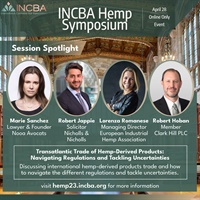
- Average Rating:
- 13
- Bundle(s):
- Hemp Symposium 2023 On-Demand Bundle
- Categories:
- Hemp | Hemp Law
- Faculty:
- Marie Sanchez | Robert Hoban | Lorenza Romanese | Robert Jappie
- Duration:
- 1 Hour 4 Minutes
- Format:
- Audio and Video
- SKU:
- INCBA042823transatlanticOD
- License:
- Access for 6 month(s) after purchase.
- Short Description:
- In this session the panelists will discuss international hemp-derived products trade. More specifically, the panelists will offer an overview of what transatlantic trade of hemp-derived products (food products, cosmetic products, vaping products…) for consumer use looks like with a particular focus on import and export of these products from the US market to the EU and/or the UK market(s) and from the EU and/or the UK to the USA.
- Price:
- $30.00 - $75.00
Tags: Hemp Symposium 2023
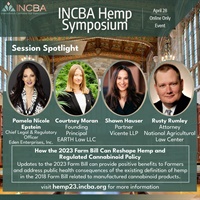
- Average Rating:
- 13
- Bundle(s):
- Hemp Symposium 2023 On-Demand Bundle
- Categories:
- Hemp | Hemp Law
- Faculty:
- Pamela Epstein | Courtney Moran, LL.M. | Shawn Hauser | Rusty Rumley
- Duration:
- 1 Hour 5 Minutes
- Format:
- Audio and Video
- SKU:
- INCBA042823farmbillOD
- License:
- Access for 6 month(s) after purchase.
- Short Description:
- In this session the panelist will set the stage by discussing the Agricultural Improvement Act, more commonly known as the Farm Bill; specifically, the watershed moment in 2018 where industrial hemp was provided a federally legal pathway. The panel will discuss the unintended consequences created by the definition and function of weight allowance for delta-9 THC and its application to manufactured hemp derived products. The impacts of the definition on the hemp industry, the regulated marijuana industry and overall public health.
- Price:
- $30.00 - $75.00
Tags: Hemp Symposium 2023
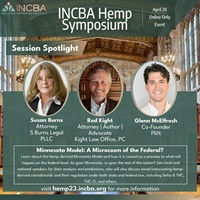
- Average Rating:
- 13
- Bundle(s):
- Hemp Symposium 2023 On-Demand Bundle
- Categories:
- Hemp | Hemp Law
- Faculty:
- Susan Burns | Rod Kight | Glenn McElfresh | Jessica Wasserman, JD
- Duration:
- 1 Hour 2 Minutes
- Format:
- Audio and Video
- SKU:
- INCBA042823microcosmOD
- License:
- Access for 6 month(s) after purchase.
- Short Description:
- Learn about the hemp-derived Minnesota Model and how it is viewed as a preview to what will happen on the federal level. As goes Minnesota, so goes the rest of the nation? Join local and national speakers for their analysis and predictions, who will also discuss novel/intoxicating hemp-derived cannabinoids and their regulation under both state and federal law, including Delta-8 THC, THC-O, and others.
- Price:
- $30.00 - $75.00
Tags: Hemp Symposium 2023
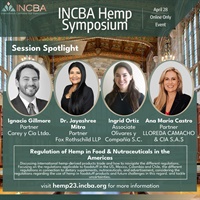
- Average Rating:
- 14
- Bundle(s):
- Hemp Symposium 2023 On-Demand Bundle
- Categories:
- Hemp | Hemp Law
- Faculty:
- Ignacio Gillmore | Dr. Jayashree Mitra | Ana Maria Castro | Ingrid Ortiz
- Duration:
- 1 Hour 3 Minutes
- Format:
- Audio and Video
- SKU:
- INCBA042823hempinfoodOD
- License:
- Access for 6 month(s) after purchase.
- Short Description:
- The panel will focus on the regulations applicable to foodstuff in the US, Mexico, Colombia and Chile. In particular, we will discuss different regulations in connection to dietary supplements, nutraceuticals, advertisement and further challenging issues for the industry, to later focus on the approach that these regulations have regarding the use of hemp in foodstuff products and future challenges in this regard.
- Price:
- $30.00 - $75.00
Tags: Hemp Symposium 2023
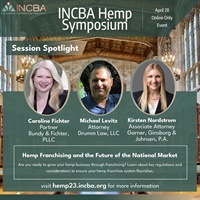
- Average Rating:
- 10
- Bundle(s):
- Hemp Symposium 2023 On-Demand Bundle
- Categories:
- Hemp | Hemp Law
- Faculty:
- Caroline Fichter | Kirsten Nordstrom | Michael Levitz
- Duration:
- 1 Hour
- Format:
- Audio and Video
- SKU:
- INCBA042823franchisingOD
- License:
- Access for 6 month(s) after purchase.
- Short Description:
- The franchise business model offers hemp business owners the opportunity to grow their brand nationally while reducing their startup and operational costs. It offers prospective hemp franchisees the chance to own their own business while benefiting from an established brand and operational system. But a poorly created franchise system or an “accidental” franchise, can expose hemp businesses to the risk of regulatory investigation, litigation, and the loss of key IP such as trademarks and trade secrets. Conflicting state regulations and the lack of significant federal guidance makes franchising a hemp business even more complex.
- Price:
- $30.00 - $75.00
Tags: Hemp Symposium 2023

- Average Rating:
- 17
- Bundle(s):
- Hemp Symposium 2023 On-Demand Bundle
- Categories:
- Hemp | Hemp Law
- Faculty:
- Jason Tarasek | Marie Sanchez | Kai-Friedrich Niermann | Andrea Steel
- Duration:
- 1 Hour 15 Minutes
- Format:
- Audio and Video
- SKU:
- INCBA042823caselawOD
- License:
- Access for 6 month(s) after purchase.
- Short Description:
- Case Law Update: A comprehensive update on recent Hemp case law
- Price:
- $30.00 - $75.00
Tags: Hemp Symposium 2023
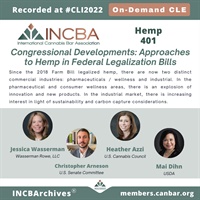
- Average Rating:
- Not yet rated
- Bundle(s):
- CLI2022 On-Demand | The Comprehensive Hemp Bundle
- Categories:
- Administrative Law | Consumption Law | Federal Law | Hemp | Hemp Law | Licensing
- Faculty:
- Jessica Wasserman, JD | Heather Azzi | Mai T. Dinh | Christopher Arneson
- Duration:
- 1 Hour 15 Minutes
- Format:
- Audio and Video
- SKU:
- INCBA072022ConDevOD
- License:
- Access for 6 month(s) after purchase.
- Short Description:
- Since the 2018 Farm Bill legalized hemp, there are now two distinct commercial industries: pharmaceuticals / wellness and industrial. In the pharmaceutical and consumer wellness areas, there is an explosion of innovation and new products. In the industrial market, there is increasing interest in light of sustainability and carbon capture considerations.
- Price:
- $30.00 - $75.00

- Average Rating:
- 2
- Categories:
- Business of Law | Cannabis | Ethics | Hemp | Litigation | Mindfullness | Social Equity | Substance Abuse
- Faculty:
- Hannah Stitt | Paige Pembrook | Jonathan Gallo | Lauren Linder
- Duration:
- 48 Minutes
- Format:
- Audio and Video
- SKU:
- INCBA08122021OD
- License:
- Access for 6 month(s) after purchase.
- Short Description:
- After becoming a cannabis lawyer, you need to ensure you are an ethical one. Learn from our panelists about the issues they confronted as soon as they entered cannabis practice, and what they never expected.
- Price:
- $30.00 - $75.00
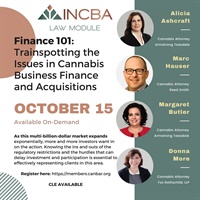
- Average Rating:
- 3
- Categories:
- Business of Law | Cannabis | Ethics | Hemp | Litigation | Mindfullness | Social Equity | Substance Abuse
- Faculty:
- Alicia Ashcraft | Marc Hauser | Margaret Butler | Donna More
- Duration:
- 1 Hour 3 Minutes
- Format:
- Audio and Video
- SKU:
- INCBA101521.101OD
- License:
- Access for 6 month(s) after purchase.
- Short Description:
- This panel of experienced practitioners will provide insight and guidance in spotting and trouble shooting the issues at the early stages of the evaluation and negotiation of cannabis business transactions.
- Price:
- $30.00 - $75.00
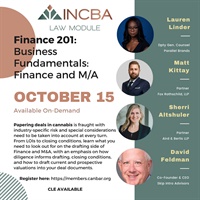
- Average Rating:
- 1
- Categories:
- Business of Law | Cannabis | Ethics | Hemp | Litigation | Mindfullness | Social Equity | Substance Abuse
- Faculty:
- Lauren Linder | Matthew Kittay | Sherri Altshuler | David Feldman
- Duration:
- 1 Hour 7 Minutes
- Format:
- Audio and Video
- SKU:
- INCBA101521.201OD
- License:
- Access for 6 month(s) after purchase.
- Short Description:
- From LOIs to closing conditions, learn what you need to look out for on the drafting side of Cannabis Business Finance and M&A
- Price:
- $30.00 - $75.00
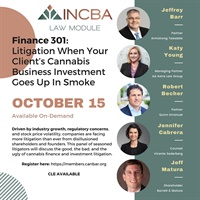
- Average Rating:
- Not yet rated
- Categories:
- Business of Law | Cannabis | Ethics | Hemp | Litigation | Mindfullness | Social Equity | Substance Abuse
- Faculty:
- Jeffrey Barr | Robert Becher | Jennifer Cabrera | Jeffrey Matura | Katy Young
- Duration:
- 1 Hour 2 Minutes
- Format:
- Audio and Video
- SKU:
- INCBA101521.301OD
- License:
- Access for 6 month(s) after purchase.
- Short Description:
- This panel of seasoned litigators will discuss the good, the bad, and the ugly of cannabis finance and investment litigation.
- Price:
- $30.00 - $75.00

- Average Rating:
- Not yet rated
- Categories:
- Advertising, Packaging and Labeling | Business | Cannabis | Consumption Law | Copyrights and Trademarks | Cross Border Markets & Commerce | Ethics | Federal Law | Hemp | Hemp Law | Regulation law | Regulations
- Faculty:
- Matthew Zorn | Cynthia Meyer | Chelsie Spencer
- Duration:
- 1 Hour 8 Minutes
- Format:
- Audio and Video
- SKU:
- INCBA081521FEOD
- License:
- Access for 6 month(s) after purchase.
- Short Description:
- Discussing in more detail what marketers of a Cannabis product should consider, what limitations and guardrails exist, and more.
- Price:
- $30.00 - $75.00

- Average Rating:
- 3
- Bundle(s):
- The Comprehensive Hemp Bundle
- Categories:
- Federal Law | International Law | International Webinar | Hemp | Hemp Law
- Faculty:
- Giacomo Bulleri | Lorenza Romanese | Sergio Martines | Cinzia Citti
- Duration:
- 1 Hour 10 Minutes
- Format:
- Audio and Video
- SKU:
- INCBA07282021OD
- License:
- Access for 6 month(s) after purchase.
- Short Description:
- An evaluation of the European perspectives and the expected repercussions on Italy.
- Price:
- $30.00 - $75.00
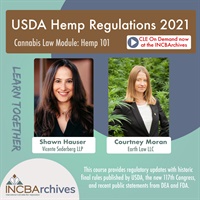
- Average Rating:
- 2
- Bundle(s):
- The Comprehensive Hemp Bundle
- Categories:
- Administrative Law | Hemp | Hemp Law
- Faculty:
- Shawn Hauser | Courtney Moran, LL.M.
- Duration:
- 1 Hour 1 Minutes
- Format:
- Audio and Video
- SKU:
- INCBA05122021HROD
- License:
- Access for 6 month(s) after purchase.
- Short Description:
- As hemp policy continues to evolve, ensure you are staying at the forefront of regulatory developments to provide your clients with the best counsel for the 2021 production season.
- Price:
- $30.00 - $75.00

- Average Rating:
- 1
- Bundle(s):
- The Comprehensive Hemp Bundle
- Categories:
- Administrative Law | Cross Border Markets & Commerce | Federal Law | Hemp | Hemp Law
- Faculty:
- Jessica Wasserman, JD | Will Woodlee | Andrea Golan | Wendi Young
- Duration:
- 1 Hour 7 Minutes
- Format:
- Audio and Video
- SKU:
- INCBA05122021FDAOD
- License:
- Access for 6 month(s) after purchase.
- Short Description:
- With a new Administration and Congress, changes in personnel at FDA and new safety data being published, is 2021 the year when CBD will come out from under the FDA shadows to be legally marketed in all 50state?
- Price:
- $30.00 - $75.00

- Average Rating:
- Not yet rated
- Bundle(s):
- The Comprehensive Hemp Bundle
- Categories:
- Environmental Law | Federal Law | Hemp | Hemp Law
- Faculty:
- Jessica Wasserman, JD | Mackenzie Schoonmaker | Michelle Bodian | Amy Wang
- Duration:
- 1 Hour 9 Minutes
- Format:
- Audio and Video
- SKU:
- INCBA061521HE3OD
- License:
- Access for 6 month(s) after purchase.
- Short Description:
- Environmental compliance is an important legal area for hemp production.
- Price:
- $30.00 - $75.00
- Average Rating:
- 6
- Bundle(s):
- INCBA’s Cannabis Law Crash Course Bundle
- Categories:
- Administrative Law | Hemp | Licensing and Permitting | Regulatory
- Faculty:
- SarahLee Gossett Parrish | David Ruskin | Scheril Murray Powell | Ms. Dina Rollman
- Duration:
- 1 Hour 8 Minutes
- Format:
- Audio and Video
- SKU:
- INCBA102220APOD
- License:
- Access for 6 month(s) after purchase.
- Short Description:
- Attendees will leave with an understanding of the best practices employed by lawyers and consultants in guiding businesses through these complicated applications, in particular how to assist one client in securing licenses in multiple states with varying qualification standards.
- Price:
- $30.00 - $75.00
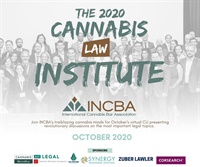
- Average Rating:
- 6
- Categories:
- Administrative Law | Hemp | Licensing and Permitting | Regulatory
- Faculty:
- Rod Kight | Frank Robison | Andrea Steel
- Duration:
- 1 Hour 15 Minutes
- Format:
- Audio and Video
- SKU:
- INCBA102020USOD
- License:
- Access for 6 month(s) after purchase.
- Short Description:
- Learn from the experts to see where you should direct your clients to succeed in the US hemp market.
- Price:
- $30.00 - $75.00
- Average Rating:
- 6
- Categories:
- Administrative Law | Hemp | Licensing and Permitting | Regulatory
- Faculty:
- Shawn Hauser | Garrett Graff | Mitzi Vaughn | Tami Wahl
- Duration:
- 1 Hour 10 Minutes
- Format:
- Audio and Video
- SKU:
- INCBA102020THOD
- License:
- Access for 6 month(s) after purchase.
- Short Description:
- With the 2018 Farm Bill well under our belts, and implementation of the USDA Rules well underway, let’s take a look at how the world is changing under the new regime. The sunset of the old administrative regimes left over from the 2014 Farm Bill and the rise of the 2018 Farm Bill regulations have created a new way to navigate the hemp industry. Join us to take a look at the terrain ahead.
- Price:
- $30.00 - $75.00
- Average Rating:
- Not yet rated
- Categories:
- Cross Border Markets & Commerce | Regulatory | Licensing and Permitting | Policy | Hemp
- Faculty:
- Robert Hoban | Daniel Kruse | Eveline Van Keymeulen | David Wenger | Kai-Friedrich Niermann
- Duration:
- 1 Hour 8 Minutes
- Format:
- Audio and Video
- SKU:
- INCBA101520IMOD
- License:
- Access for 6 month(s) after purchase.
- Short Description:
- Take a look at the legal hemp trade, how biomass is moving, and what import and retail of cbd looks like around the world.
- Price:
- $30.00 - $75.00

Product Type

Product Type
- Faculty:
- Rend Al-Mondhiry | Amber Littlejohn | Andrea Steel | Eric Steenstra | Cynthia Cabrera | JD McCormick | Philip Snow | Tami Wahl

Product Type

Product Type

Product Type
- Faculty:
- Marie Sanchez | Robert Hoban | Lorenza Romanese | Robert Jappie | Pamela Epstein | Courtney Moran | Shawn Hauser | Rusty Rumley | ....

Product Type

Product Type
- Faculty:
- Jessica Wasserman | Heather Azzi | Mai T. Dinh | Christopher Arneson | Giacomo Bulleri | Lorenza Romanese | Sergio Martines | Cinzia Citti | ....

